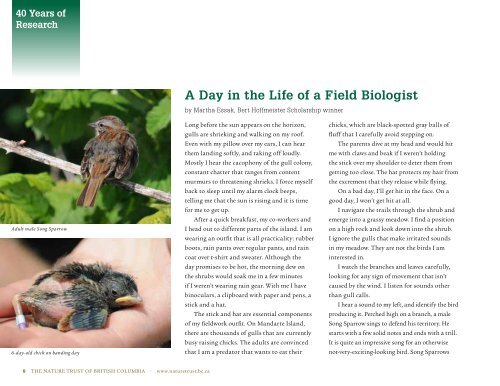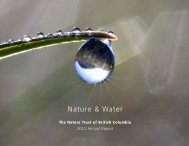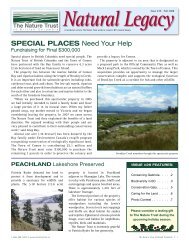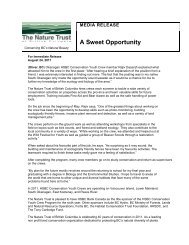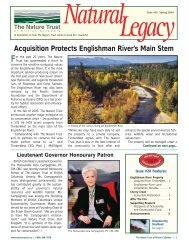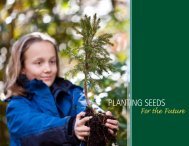2011 Annual Report - Nature Trust of British Columbia
2011 Annual Report - Nature Trust of British Columbia
2011 Annual Report - Nature Trust of British Columbia
Create successful ePaper yourself
Turn your PDF publications into a flip-book with our unique Google optimized e-Paper software.
40 Years <strong>of</strong><br />
Research<br />
A Day in the Life <strong>of</strong> a Field Biologist<br />
by Martha Essak, Bert H<strong>of</strong>fmeister Scholarship winner<br />
Adult male Song Sparrow<br />
6-day-old chick on banding day<br />
Long before the sun appears on the horizon,<br />
gulls are shrieking and walking on my ro<strong>of</strong>.<br />
Even with my pillow over my ears, I can hear<br />
them landing s<strong>of</strong>tly, and taking <strong>of</strong>f loudly.<br />
Mostly I hear the cacophony <strong>of</strong> the gull colony,<br />
constant chatter that ranges from content<br />
murmurs to threatening shrieks. I force myself<br />
back to sleep until my alarm clock beeps,<br />
telling me that the sun is rising and it is time<br />
for me to get up.<br />
After a quick breakfast, my co-workers and<br />
I head out to different parts <strong>of</strong> the island. I am<br />
wearing an outfit that is all practicality: rubber<br />
boots, rain pants over regular pants, and rain<br />
coat over t-shirt and sweater. Although the<br />
day promises to be hot, the morning dew on<br />
the shrubs would soak me in a few minutes<br />
if I weren’t wearing rain gear. With me I have<br />
binoculars, a clipboard with paper and pens, a<br />
stick and a hat.<br />
The stick and hat are essential components<br />
<strong>of</strong> my fieldwork outfit. On Mandarte Island,<br />
there are thousands <strong>of</strong> gulls that are currently<br />
busy raising chicks. The adults are convinced<br />
that I am a predator that wants to eat their<br />
chicks, which are black-spotted gray balls <strong>of</strong><br />
fluff that I carefully avoid stepping on.<br />
The parents dive at my head and would hit<br />
me with claws and beak if I weren’t holding<br />
the stick over my shoulder to deter them from<br />
getting too close. The hat protects my hair from<br />
the excrement that they release while flying.<br />
On a bad day, I’ll get hit in the face. On a<br />
good day, I won’t get hit at all.<br />
I navigate the trails through the shrub and<br />
emerge into a grassy meadow. I find a position<br />
on a high rock and look down into the shrub.<br />
I ignore the gulls that make irritated sounds<br />
in my meadow. They are not the birds I am<br />
interested in.<br />
I watch the branches and leaves carefully,<br />
looking for any sign <strong>of</strong> movement that isn’t<br />
caused by the wind. I listen for sounds other<br />
than gull calls.<br />
I hear a sound to my left, and identify the bird<br />
producing it. Perched high on a branch, a male<br />
Song Sparrow sings to defend his territory. He<br />
starts with a few solid notes and ends with a trill.<br />
It is quite an impressive song for an otherwise<br />
not-very-exciting-looking bird. Song Sparrows<br />
8 The <strong>Nature</strong> <strong>Trust</strong> <strong>of</strong> BRITISH COLUMBIA • www.naturetrust.bc.ca


